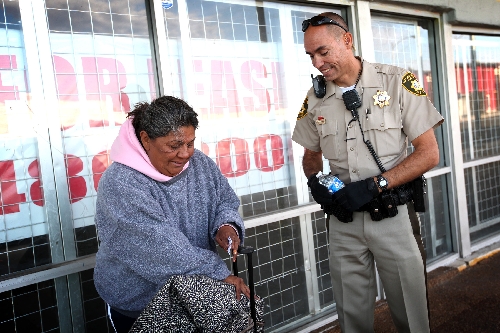Las Vegas police reach out to homeless
It's just after sunrise when officer Mark Washington encounters Darla and maybe changes her life forever.
She's still asleep, curled up against the facade of an upholstery shop on Main Street, insulated against the cold by layers of clothes. A small suitcase is at her side.
Washington pulls up in his police cruiser, rolls down the window and calls out to her.
Darla's up in an instant, sees Washington's smile and bursts into tears. Her story spills out almost as quickly.
She's 51 years old, nearly 30 days sober and has two grown sons she hopes are still alive. She needs help.
"It's a mess," she says, wiping away tears.
Washington climbs out of the cruiser.
This is a couple hours into his shift as an officer for the Metropolitan Police Department's Homeless Evaluation Liaison Project (HELP), a team of officers tasked with enforcing the law and reaching out to the down-and-out in the downtown homeless corridor.
"I'm just going to be honest," Washington says. "We are better at enforcement."
The team includes three officers, one of whom splits his time with another unit. Before recent budget cuts, the team had four full-time officers.
"I'm just going to be honest," Washington says again. "We haven't been as effective with less people."
He is suited for the job. Tall and rangy, he's armed with a toothy grin and plenty of pep talks. His nickname is Officer Friendly.
Washington tells Darla about a new rehab program in Elko she may qualify for. If she's interested, he'll drive her to the program's Las Vegas offices.
"I can do a rehab for six months," she says. "I would love that."
Washington tells her to gather her things. He'll be back to pick her up in about 15 minutes.
"This is how you can tell if she's serious," he says as he pulls away.
While patrolling the corridor, Washington talks about how things have changed in just the year and a half since he was assigned to HELP.
"When I first started, there was room every night at every shelter," he says. "Now we have to call and see if there is room. Most times they're full. Before, people would start lining up at 4 p.m. for beds. Now they start at 1 in the afternoon."
It's no surprise. The number of homeless people living on the streets in Clark County increased by about 40 percent, from 3,027 to 4,241, between 2009 and 2011, according to a large-scale January homeless count.
In the downtown homeless corridor, which officials call the Corridor of Hope, and surrounding neighborhoods, the number increased 230 percent, from 377 to 1,245.
At the same time, homeless service providers are making do with decreased funding and fewer resources.
Washington pulls onto Foremaster Lane just east of the Strip, where several vehicles are parked. People are living in them.
One is a 43-year-old man named Brian. He and his father for the past couple days have been sleeping in the camper on the back of their banged-up 1989 Ford pickup. They ran out of money for a short-term apartment rental after paying $1,800 for repairs to the pickup, Brian says.
"So many people are just one paycheck away from this," he says.
Brian doesn't work, but gets a monthly pension check from the U.S. Army, he says. It isn't enough. He lost his house to the bank three years ago.
Also with Brian is Big Al Capone, the bulldog mix he rescued eight months ago. He's the reason Brian won't go to a shelter. They won't take the dog.
Washington passes out a few cards containing information about services available downtown, then climbs back into his cruiser.
"Darla!" he says. "We've got to go get Darla!"
She's still there, still crying. But during the drive to the rehab program's office she starts having second thoughts.
"Are you sure I'll be OK?" she asks Washington. "What if I get bad vibes? What if I change my mind?"
He is expecting this.
"Darla," he says, "I'm going to give you a pep talk."
Focus on the benefits of following through with something, he tells her. Everybody faces roadblocks. Imagine yourself walking across a stage, graduating from rehab. Maybe your sons will even be there.
This appears to be the clincher. Darla's ready for rehab.
Shortly before saying goodbye, before Washington gives her a farewell hug, Darla offers up a quiet little prayer.
"I'm feeling reality and it hurts like hell," she says. "But I'm not going to drink about it. I'm not."
Contact reporter Lynnette Curtis at lcurtis@reviewjournal.com.

















